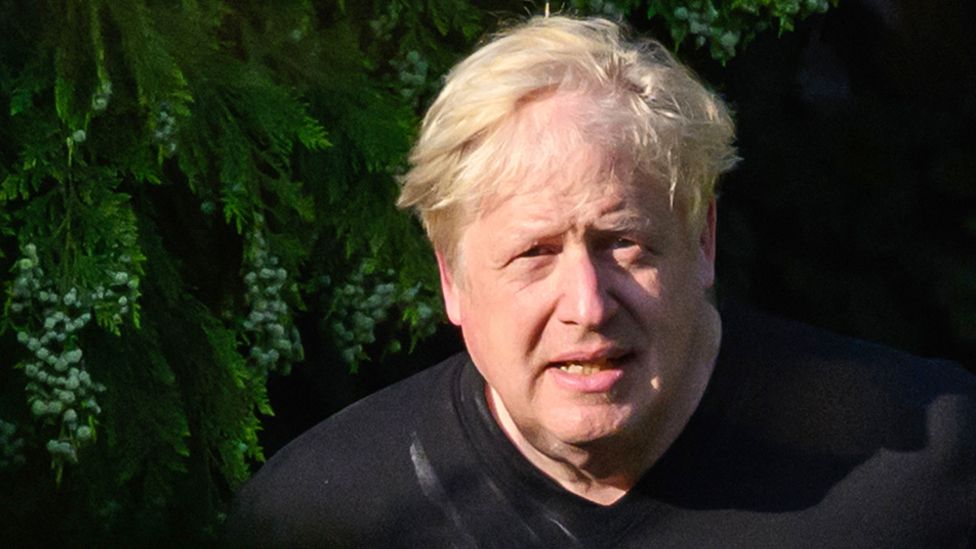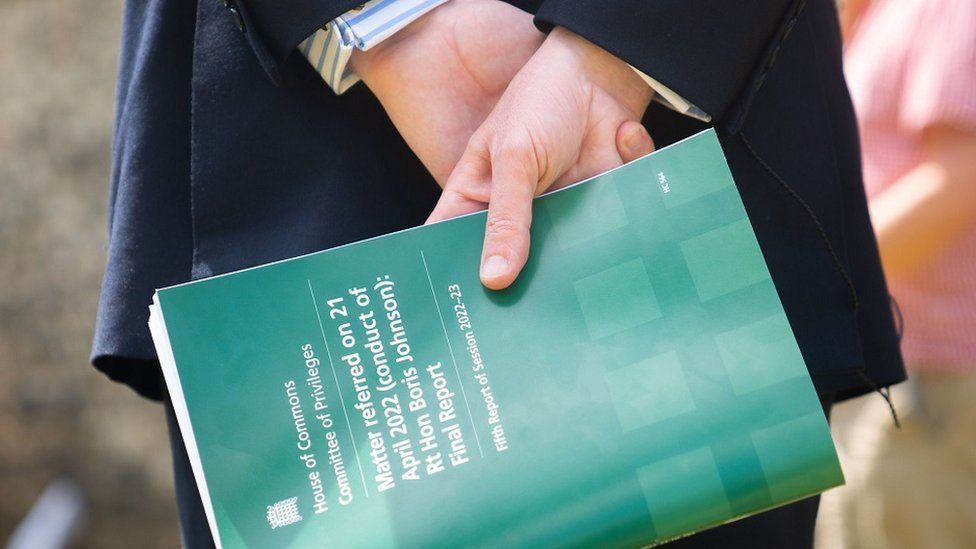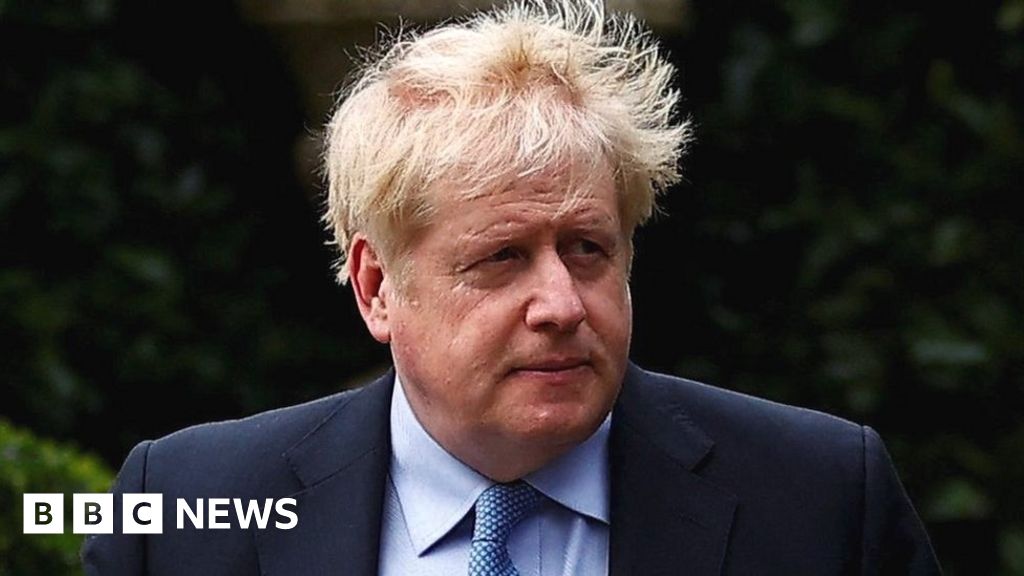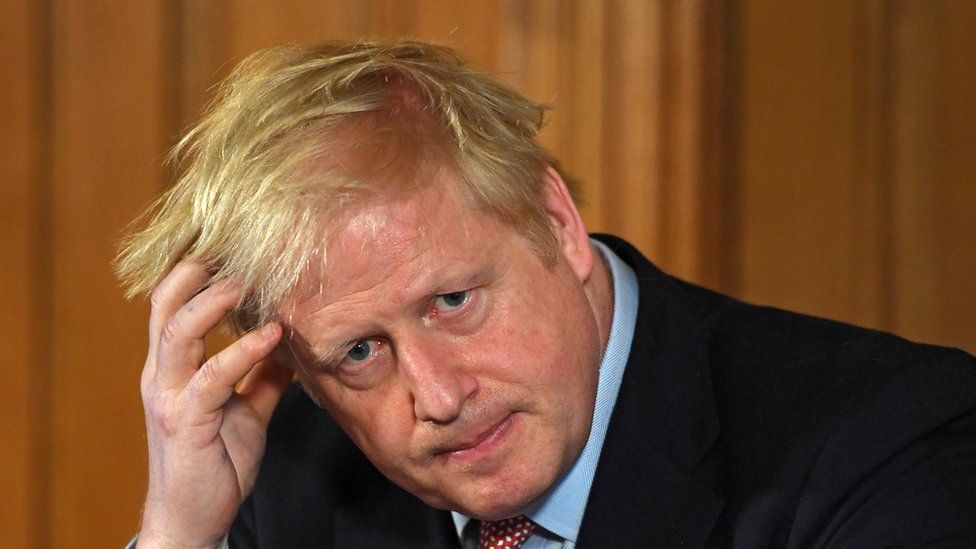This video can not be played
To play this video you need to enable JavaScript in your browser.
MPs have backed a report that found Boris Johnson deliberately misled MPs over lockdown parties at Downing Street.
The Commons voted overwhelmingly in support of the report, by 354 to seven.
The cross-party committee’s report had found Mr Johnson committed repeated offences when he said Covid rules had been followed at No 10 at all times.
Several allies of Mr Johnson questioned the impartiality of the committee and said they would vote against.
Former Prime Minister Theresa May, Commons Leader Penny Mordaunt and Education Secretary Gillian Keegan were among the senior Conservatives who supported the report’s findings.
Conservative MPs who voted against included Sir Bill Cash, Nick Fletcher, Adam Holloway, Karl McCartney, Joy Morrissey and Heather Wheeler – while 118 Tories voted in favour.
No vote was recorded for 225 MPs, because they either abstained or did not turn up to vote.
Mr Johnson had asked his supporters not to vote against the report, with sources close to the former prime minister arguing it had no practical effect now he has resigned.
But his critics suggested the move was designed to avoid revealing the low level of support for him among Tory MPs.
Some abstained, while others did not turn up to vote at all.
Johnson allies who spoke in the debate but did not vote include Sir Jacob Rees-Mogg and Lia Nici.
Prime Minister Rishi Sunak did not attend the debate and has refused to say how he would have voted, suggesting he did not want to influence others.
The Liberal Democrats accused Mr Sunak of “a cowardly cop-out”.
The party’s deputy leader Daisy Cooper said: “His failure to vote says all you need to know about this prime minister’s lack of leadership.”
A Labour Party spokesperson said Mr Sunak was “too weak to lead a party too divided to govern”.
The vote means Mr Johnson loses his right to a parliamentary pass, which gives access to certain parts of Parliament, as this was one of the report’s recommendations.
The Privileges Committee of MPs, which has a Conservative majority, was asked to investigate whether Mr Johnson had misled MPs over what he knew about parties held in Downing Street during Covid lockdowns – dubbed the Partygate scandal.
Its report concluded that Mr Johnson made multiple deliberately misleading statements to Parliament about events at No 10.
Ahead of the report’s publication, Mr Johnson announced he was quitting as an MP, branding the committee a “kangaroo court”.
The report found Mr Johnson had committed further “contempts” of Parliament by attacking the committee, increasing the severity of the recommended sanction.
The committee subsequently recommended a 90-day suspension for Mr Johnson – a long ban by recent standards – as well as denying him the parliamentary pass, which he would normally be entitled to as a former MP.
If he had still been an MP, the suspension could have triggered a by-election in his constituency.
Speaking during a Commons debate ahead of the vote, Mrs May said backing the report would be “a small but important step in restoring people’s trust” in Parliament.
It was “important to show the public that there is not one rule for them and another for us”, she said.
Mrs May urged her fellow MPs to vote in support of the report “to uphold standards in public life, to show that we all recognise the responsibility we have to the people we serve, and to help to restore faith in our parliamentary democracy”.
This video can not be played
To play this video you need to enable JavaScript in your browser.
During the debate, supporters of Mr Johnson spoke out against the report’s findings.
Ms Nici, who was Mr Johnson’s parliamentary private secretary, told MPs she could not see any evidence he had knowingly misled Parliament.
She questioned the impartiality of the committee and suggested the process was “political opportunism” for people who did not like Mr Johnson.
Former minister Sir Jacob, who was knighted by Mr Johnson in his resignation honours, described the proposed 90-day suspension as “a vindictive sanction”.
In response to accusations some Johnson allies had attempted to discredit the committee’s work, Mr Rees-Mogg said it was “absolutely legitimate to criticise the conduct of a committee” and its members.
However, the committee’s chairwoman, Labour MP Harriet Harman, said its members had to “withstand a campaign of threats, intimidation, and harassment designed to challenge the legitimacy of the inquiry”.
She defended her impartiality, after Sir Jacob referenced her previous tweets criticising Mr Johnson, saying she had offered to step aside as chairwoman after the tweets emerged but she said she was assured by the government she should continue in her role.
This video can not be played
To play this video you need to enable JavaScript in your browser.
Earlier it was not clear whether there would be a formal vote on the report – compelling MPs to go on the record to either vote for, against or abstain – but Labour forced one.
It was a free vote for Tory MPs, meaning party managers – known as whips – had not instructed them how to vote.
Commons Leader Ms Mordaunt, who opened the debate, said she would vote in support of the report, adding: “The integrity of our institutions matter.”
However, she said “all members need to make up their own minds and others should leave them alone to do so”.
Related Topics
-
-
10 hours ago

-
-
-
4 days ago

-

